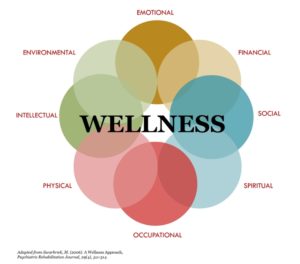Connect the dots to happiness through embracing wellness practices
Mental Health, Physical Health

This month, the ALV team is centering on “healthy body, healthy mind” which presents a perfect opportunity to provide further insight to the somewhat broad concept of “wellness”. My philosophy is that people who live most healthful are also the happiest. With this premise in mind, I both inspire and guide people towards conscientious, healthful living behavior and decision making.
Below are the primary dimensions of wellness. Your mindset falls within these dimensions, particularly the intellectual and emotional petals.

It is important to understand that these dimensions will intertwine. Identifying ways to utilize that overlap between the mind and other physiological functionality to support overall wellness is a trending area in lifestyle health and healthcare approaches. For example, appropriate nutrition, limiting or avoiding environmental aspects that may be adverse in nature, and paying attention to your social environment are all means of supporting the system which powers your mood and well-being.
But a key component to favorable lifestyle health is human behavior. Changing behaviors which are non- or less supportive of health and wellbeing can be incredibly challenging. Motivational triggers and barriers, social support, and even the environment in which a person lives can impact our ability to make lasting behavioral changes.
According to Dr. Cynthia Sholes, PhD of the Mind Wave Institute, behaviors, habits, and mental function are largely the result of automated, unconscious activity within the nervous system. In other words, behaviors can be so hard to change because we largely conduct them without even being conscious of it! However, similar to strength training muscles, concerted effort can be exercised to best activate the processes that are not on auto-pilot and, therefore, instigate stronger will power and analytical thinking. This is otherwise known as training the mind. Mind training helps you increase awareness and serves as a gateway to the parts of the mind that are automated in nature, putting you on the right path to be able to influence your behaviors.
A great exercise for starting to bring greater awareness to our mental function and behavior, as you may have heard from one of your ALV coaches, is to examine the impact of the stories we tell ourselves. It is important to ask ourselves what behaviors these stories are reinforcing in us by asking the following questions:
- Are they clarifying our level of understanding for something or making our mindset cloudy?
- Do the stories encourage us to move forward, accept circumstances we can’t control, but motivate us to make effective change for those we can?
On a personal level, practicing mind training exercises that bring about focus on awareness has played a critical role in keeping me focused on supportive lifestyle decisions and protocols related to my health as I worked to overcome challenges presented by autoimmune conditions. In doing so, I had to take a concerted look at the story I was telling myself. Practicing a conscience approach to knowledge and acceptance of my circumstances led me to stay positive, motivated, and structured while I made the behavioral changes I needed to make in response to my health conditions.
I also needed to make changes to my dietary plan given that nutrition triggers a range of physiological activity associated to mental performance, muscle function, energy levels, and sleep quality. Furthermore, quality of dietary intake can impact memory, thinking and learning, clarity, and coordination which tie into productivity, creativity, resilience, and social connections.
It didn’t stop there. I altered my personal care and household products, sleep schedule, and even how I engaged in my social environment. All of these elements were contributing factors to help me not only be healthy but happier and more productive in my work.
Below are four take-aways to increase your level of awareness and engagement in supportive, healthful living practices:
- Train the mind like a muscle. Behavior science has taught us that repetition and duration (like an exercise plan) are important. Scientists call this “dose”. Visionary tactics such as retelling one’s story can further support this activity.
- Practice living well. Knowledge for dimensions of wellness can support your journey and guide decision making. It doesn’t take a science lesson every day, but acceptance that lifestyle health is definitely a sum of inter-connected parts. An action taken in one dimension will have respective effects across other dimensions. This is part of what we mean when we use terms such as “whole health” or “holistic” with regards to health and healthcare approaches.
- Pay special attention to the nutrition. This may be a health coach’s bias; however, it is one that is thoroughly backed by science. Appropriate intake across phytonutrients, such as antioxidants and enzymes, and amino acids from food are foundational to physiological mechanisms within our biochemistry. Appropriately trained professionals can help you come up with dietary intake strategies best suited to your lifestyle and individual circumstances.
- Consider a structured program. According to Dr. Sholes, people like to stick to a program and a 30-day plan is ideal to form a stable habit. This also aligns well to many scientific studies centered on human behavior change and health outcomes.
Want more from Ama La Vida? Sign up for our newsletter 🙂


